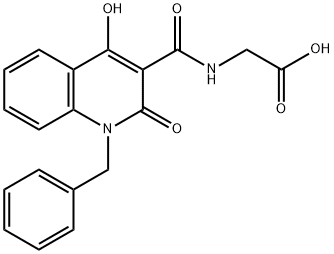Uses
IOX2 is a potent inhibitor of HIF-1α prolyl hydroxylase-2 (PHD2) with IC50 of 21 nM.
Uses
IOX2 has been used as PHD inhibitor to induce pseudo-hypoxia.
Definition
ChEBI: 2-[[[4-hydroxy-2-oxo-1-(phenylmethyl)-3-quinolinyl]-oxomethyl]amino]acetic acid is a member of quinolines.
Biological Activity
iox2 is a potent and selective inhibitor of hif-1α prolyl hydroxylase-2 (phd2) with an ic50 of 21 nm for phd2/elgn-1 in a cell-free assay, iox2 has shown >100-fold selectivity over jmjd2a, jmjd2c, jmjd2e, jmjd3, or the 2og oxygenase fih [1].phds consist three isoforms, named phd1, phd2 and phd3. phds are dioxygenases that utilize oxygen as co-substrate providing the molecular basis for the oxygen-sensing function of these enzymes. it has been reported that phds are strikingly sensitive to graded levels of hypoxia, mirroring the progressive increases in hif-1α protein and dna binding activity that are observed when cells are exposed to gradual hypoxia [2]. in rcc4 cells, iox2 inhibited hif-1α hydroxylation at 50 μm [1].
Biochem/physiol Actions
IOX2 is selective and potent inhibitor of prolyl hydroxylases (PHD). Stabilization of HIF-1R through inhibition of PHD has been examined as a potential treatment for ischemic diseases including anemia, myocardial infarction, and stroke. IOX2 is a selective inhibitor of the hypoxia inducible factor (HIF) prolyl-hydroxylases (PHD) that exhibits up-regulation of HIF1a in zebrafish. For full characterization details, please visit the IOX2 probe summary on the Structural Genomics Consortium (SGC) website.To learn about other SGC chemical probes for epigenetic targets, visit sigma.com/sgc
References
[1] murray j k, balan c, allgeier a m, et al. dipeptidyl-quinolone derivatives inhibit hypoxia inducible factor-1α prolyl hydroxylases-1,-2, and-3 with altered selectivity[j]. journal of combinatorial chemistry, 2010, 12(5): 676-686.
[2] berra e, benizri e, ginouvès a, et al. hif prolyl‐hydroxylase 2 is the key oxygen sensor setting low steady‐state levels of hif‐1α in normoxia[j]. the embo journal, 2003, 22(16): 4082-4090.


